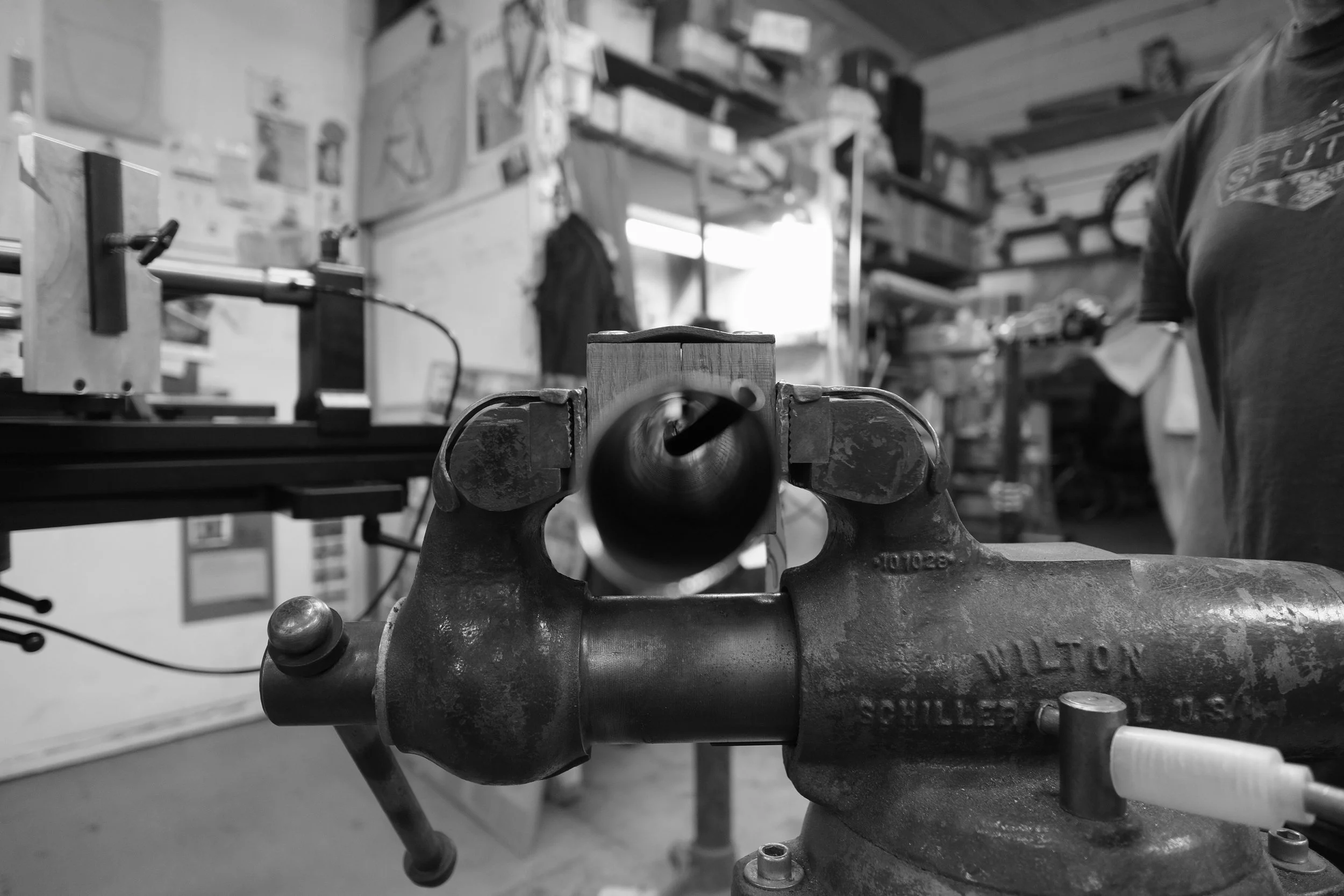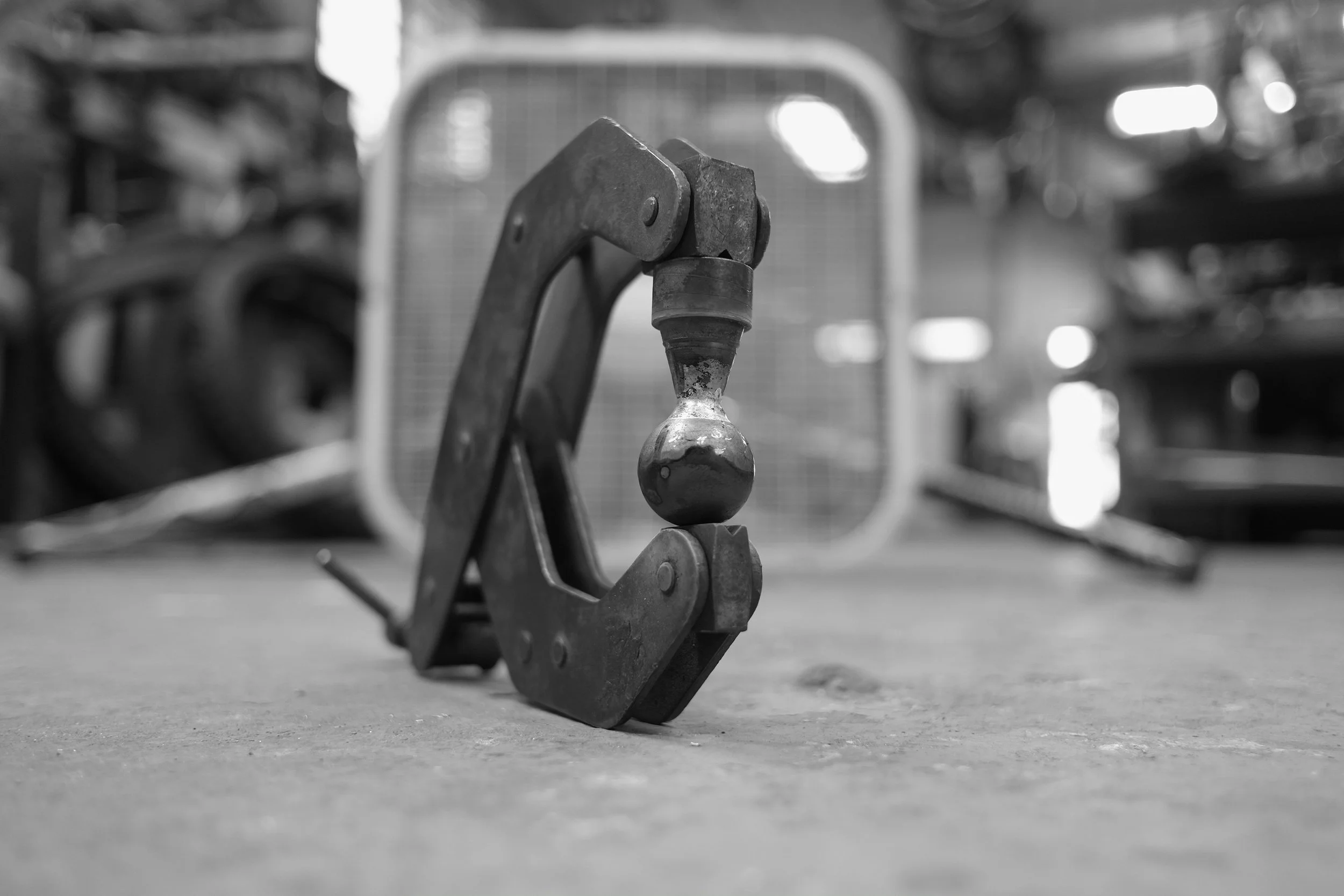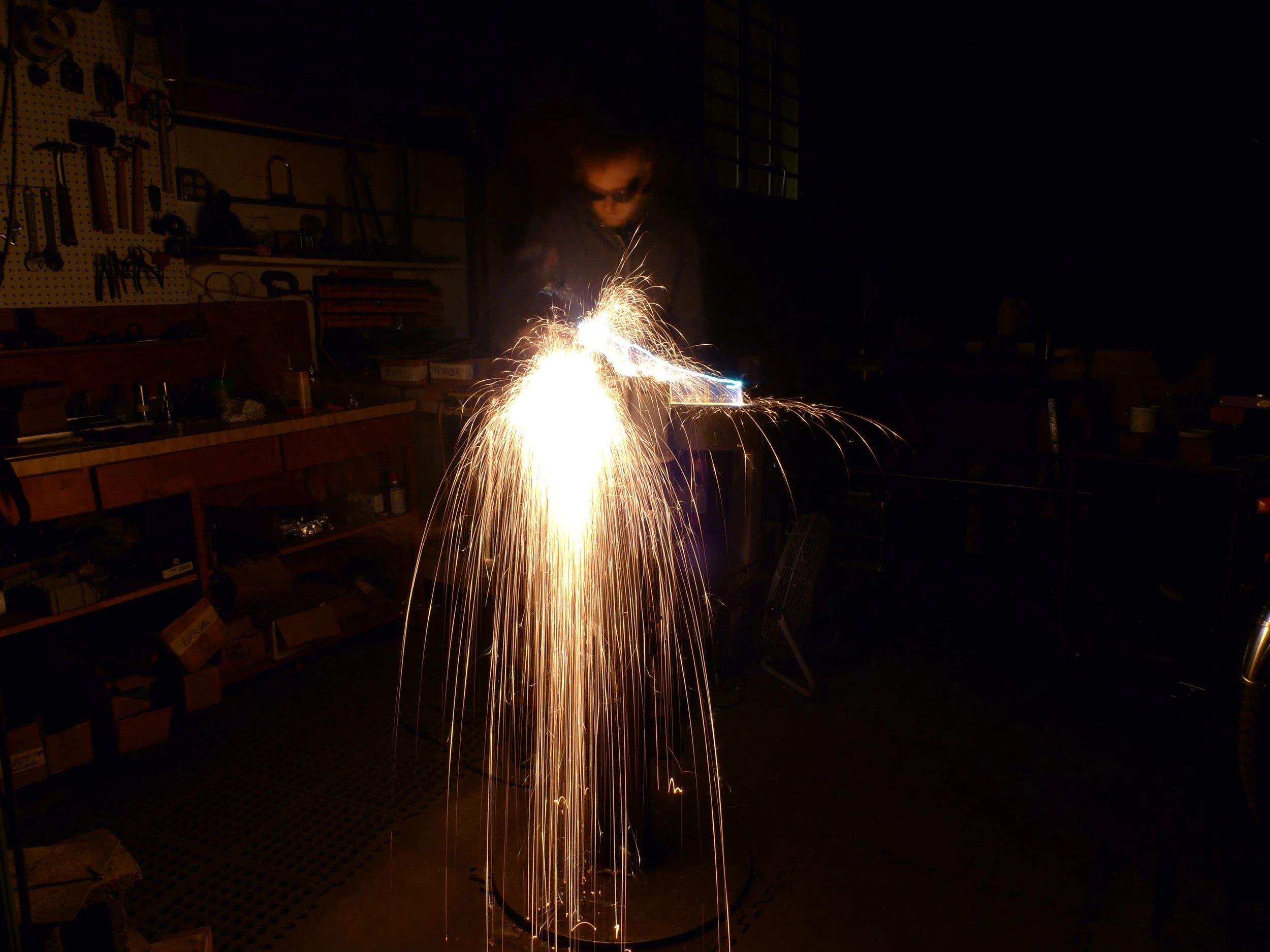Over the years people have periodically asked me how I started building bicycle frames. Like with any story, there’s a short version and there’s a long version. The short version is, I took a class, bought some tools, practiced and practiced and practiced, got better at it, got a few lucky breaks, kept doing it and lo and behold, twenty years have passed and here I am. This version of the story leaves out most of the interesting stuff, though. So if you’d like to hear the beginning of the longer version, please keep reading.
When I was a kid I wanted to fly airplanes. The fast kind, not so much passenger planes. My dad was a pilot, he was licensed to fly single-engine prop planes and sometimes he would take my mom and I out. This was back in the early 1970s when you could rent a Cessna for like $30 a day, and fuel cost next to nothing.
We lived in Kansas City, Missouri, and story has it that one time we flew down to the Bahamas. I don’t remember the Bahamas, but apparently while there I got a sunburn. This sounds plausible, my hair was coppery red (it’s since gone brownish-gray), my skin fair and readily sun-burnable. Another time we went to Tucson to visit some relatives, where it’s likely I again got a sunburn. I’m sure there were other flights, less goal oriented, just for the sake of being up there. I was so young I don’t know where the memories overlap with photos and stories I’ve heard. And I guess it doesn’t matter — something got into my blood and the desire to fly stayed with me.
Maybe a decade later, I’d mostly forgotten about being a pilot. I wasn’t sure what I wanted to be, but there were a lot of things I was sure I didn’t want to be, most of which had to do with being average. I was a teenager in the midwest, I wanted to break the mold and be somebody totally unique, do something amazing. I wanted to become something that the world had never yet beheld, anything but being your average Joe.
People still asked me what I wanted to be when I grew up, especially as I got closer to college age, but I had no idea. Just to have something to say I said I wanted to be a writer. I mean, I wrote, I liked writing, it was about the only constructive thing I could figure out to do with all my confusion. And as a byproduct of practicing it I discovered that in its best moments writing was kind of like flying. But that came later.
At the time most of what I wrote was so bad it gave me physical pain, both to write it, and then to read it. Seriously, woe was me. Most of what I knew about expressing myself in writing came through punk and metal song lyrics and the poetry of Charles Bukowski. The thing about writing is you can’t hide how phony you are on the page. The only way I could think of to hide that was to hide my writing.
And so I did. I vowed to never show anyone what I’d written. I was going to be one of those secret writers who disappeared inside of black clothes and only ever got discovered by accident. Usually only after they’re dead. I thought by then it might be OK to let people read my work. I’d give it time. If somehow I accidentally got old (whoops! crap!) and if I still totally sucked I could always burn everything I’d written before dying, thereby immortalizing myself as a Secret Writer Forever.
Anyway, I was not a natural-born writer. I was so young, I had so little living under my belt. I needed experiences to write about. I picked away at college, but my heart wasn’t into it. Too expensive, and what was college for except to get a job? I didn’t want a job. I wanted a life, on my own terms. Remember, whatever I was going to do, it was going to be amazing. It took a couple of false starts and 3 colleges over a handful of years to come to terms with what I thought freedom was and how I wanted to pursue it.
That was when, like a ghost of Jack Kerouac, I went on the road. It was late 80s into the 90s. Punk rock was the thing, then grunge. I kept to the margins of the margins, a full time imposter, kind of a tentative, poorly designed punk. I didn’t know how to fit with the cool kids but I liked the music. I wore the uniform of my brethren — tattered clothes that were, once upon a time, all black, but with continual wear went kind of greenish brown. I smelled bad and became immune to it. I mean, I was on the road.
I went from place to place, didn’t stay in anywhere for long, from menial job to seasonal job, to whatever job, to no job, always just barely getting by. I had a bike sometimes, and sometimes I didn’t. I worked on the salmon boats in Alaska, traveled for months down in Mexico and Central America. Was a bike messenger in Portland; worked at an animal shelter in Lawrence, Kansas, just down the road from where William Burroughs lived. I saw punk bands play: Gwar in New Orleans; the Quincy Punx in LA; 2000 DS at CBGB in New York; Primus in Denver; No Means No in Padova, Italy.
Money was always very thin. Instead of coins I collected stories. They were my currency. I rode my bike cross country, moved a rich lady’s furniture from Aspen to Little Rock, met her father, whom, as a fully adult woman she still called, “daddy.” He was on oxygen and smoked cigarettes and sat there in this little cart glaring at me and another guy who loaded an unbelievable amount of furniture onto a truck. I traveled back to Alaska to fish, nearly sank the boat; went back to Mexico, back to Portland, back across the country. I worked at an independent bookstore in New Haven, Connecticut, and got a job shelving books at Sterling Memorial Library on the Yale University campus, a school I knew I would never attend. I lived in a squat in the East Village in Manhattan; lived in my tent and worked for a couple of months on Martha’s Vineyard; lived in a car here and there, until it ran out of gas and got towed. Went to Ireland for almost a year, Doolin and Galway, not really searching for my Irish roots, but practicing the old ways nonetheless — surviving on a few potatoes and casks of Guinness. Northern Spain for a few months; then to Italy for a couple of years teaching English, where I rode my bike over most of the northern half of the country, touring through parts of Croatia and Slovenia.
This went on for nearly a dozen years. But then I got older. At thirty, thirty-one, the stories that had put me on the road had changed, were no longer serving me. The way things were going I was never going to become that amazing creature I’d vaguely imagined. I was just going to wander until I was totally worn out and then lay down and die. The problem revealed itself: I always bought one-way tickets, I had nowhere to be.
Over a handful of years in the mid and late 1990s I’d been in and out of Portland, Oregon, staying sometimes weeks, sometimes months at a time. I was always planning my departure, but I liked being here. Its size, its trees, how unbelievably green it was, the flowers, the proximity to mountains, forest, and ocean. And the vibe here at the time was creative, DIY, it felt like you could craft your own way, try new things, and be around smart young people who were doing so for themselves. The point of connection for a certain crowd of us were bicycles. The infrastructure wasn’t here yet, but the layout of the city was good for getting around by bike.
Looking back, my bicycle was one of my few reliable sources of happiness. I was so constrained by my system of beliefs (militant proto-punk ethos), but riding a bike got me out of my head, was good for quieting the internal chatter. Portland gave me plenty to explore, and whenever I went out wandering through the neighborhoods or up into Forest Park I felt better, felt alive. I mentally mapped larger and larger swaths of the city, and then beyond it. I didn’t care if it rained, I liked the rain. I just wanted to be out moving, always moving. But then at the end of the day to be able to return to my room, to whatever space I called home. This was important.
In the fall of 2002 I returned to Portland, this time ready to stay a while. That next spring I met a man named Tim P. who lived across the river in Washington. He held classes in his garage teaching people how to construct bicycle frames. He was a school teacher, had raced bikes in the 70s, built bikes through the 80s. He wrote The Paterek Manual for Bicycle Frame Builders, considered the Bible for would-be bike makers.
I worked two jobs (restaurant, bike shop), saved my pennies and took his class. While steering me through a build Tim told me he was retiring and wanted to clear out his garage. He offered to sell me his equipment at a good price, everything I would need to continue building bike frames on my own. For me, a case of being in the right place at the right time.
One of the biggest barriers to entry into making bike frames is gathering all the tools. Where do you even start? If you don’t have a certain number of set pieces you pretty much can’t do anything at all. And buying or making those pieces requires money, time, and know-how. At the bare minimum one needs a torch and regulators, some files, a hacksaw, a vice, tube blocks, jigs to hold things straight and in a plane, dummy axles, a few other things. Basic stuff, and this does not account for the time and practice required to bring your skills up. Especially if you’re like I was then — I hadn’t used many of these tools. Not ever. But it was a time in my life where I was desperate to do something that I found meaningful.
I had no plan to become a bike builder when I started. I just wanted to make things, to cut and burn metal and turn it into something cool and useful. Mainly to have fun. And it was fun, but it was work, also. And up to this point in my life work and fun had never been in the same room together unless I was doing something stupid or unethical. This meant that whenever I sold a bike or a rack it felt like I was getting away with something. A very weird feeling, totally novel, making something with my hands that someone is willing to pay for. It was kind of addictive. It took a few years to realize what I had going on and the potential for it. I had no background with business. My only business plan was the same one I’d always had — to survive from one meal to the next.
It’s hard to believe that was twenty years ago. And it’s kind of mind-blowing to think how sometimes things come to us when we really really need them. What a blessing, eh? It’s not just a neat, pithy summation to say that bicycles saved my life. I can be a very slow learner, and in some ways have a lot of resistance to new things; to change. Even when it’s good for me, or maybe especially when. This is something I’m working directly with in the New Year, in 2023 — my resistance. Recognizing it, acknowledging it while not letting it derail me from persevering on whatever path I may be pursuing. Not a resolution so much as an intention.
Here I’m thinking of my relationship to writing. I write a lot, but I still hold myself back from sharing. I ask myself, Who really needs to hear underdog stories from another white dude in America? There’s part of me that believes we’ve heard enough from people who look like me.
But there’s another part that knows I have a story to tell. Contemplating what makes a meaningful life is a way of pursuing a concept that transcends stereotypes. I was born here, I am who I am because of where I came from, what I look like, who I’ve been around — parents and peers and punks — how I’ve engaged, and the feedback I’ve gotten along the way. You might say I started under water. It took a lot of years swimming around to even begin to see the surface.
Anyway, bike building gradually became a full stop on my previous life. Rather than continuing to search outward, I went in. All in. The only way I could make it work, as a craft, and as a business, was to look at what my hands were doing, and at what my mind was saying, and start being fair to myself and to give new things an honest try. To practice. To start using tools that were helpful and admit what was hindering me and to begin learning how to undo these things and let them go. To fail and fail again. And, as I’ve heard said about writing — To fail better.
Luckily, I like making things and seem to have a bit of a knack for it. I believe in bicycles and thrive on problem solving, and temperamentally, I can be as stubborn as they come.
I think it is a baseline requirement for making a craft-based business work: The obstinance of a mule and the desire to keep doing what you’re doing, even when you don’t want to. Without these it will be very hard to continue going forth when hard times come. And hard times will come, like a perfectly calibrated test to discover your personal breaking point. Resist as much as you like, it will come, it will push you right on over the edge and shatter you, again and again.
Anyway, I’ve got stories. This is my way of trying to convince myself to begin telling you some of them.
So let’s get started on down the road in this New Year.



